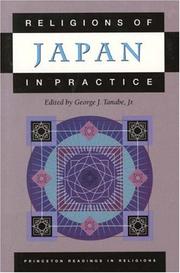| Listing 1 - 3 of 3 |
Sort by
|
Book
Year: 1949 Publisher: Kyoto : Society for the Pub. of Sacred Books of the World,
Abstract | Keywords | Export | Availability | Bookmark
Book
ISSN: 15709434 ISBN: 9789004186538 9004186530 9004193790 1283856352 9789004193796 Year: 2010 Volume: 129 Publisher: Leiden: Brill,
Abstract | Keywords | Export | Availability | Bookmark
 Loading...
Loading...Choose an application
- Reference Manager
- EndNote
- RefWorks (Direct export to RefWorks)
Shin Buddhism (Jōdo Shinshū), although weakened in many ways by secularization, continues to be a stable presence in Japanese society, as is emblematically shown by the very symmetrical position of the Nishi (Honganji-ha) and the Higashi Honganji (Ōtani-ha) head temples in the center of Kyōto, and by the recent projects for their renovation. This book addresses the need for more academic research on Shin Buddhism, and is specifically directed at describing and analyzing distinctive social aspects of this religious tradition in historical and contemporary perspective. The contributions collected here cover a wide range of issues, including the intersection between Shin Buddhism and fields as diverse as politics, education, social movements, economy, culture and the media, social ethics, gender, and globalization.
Shin (Sect) --- Religion and sociology --- Shin (Secte) --- Sociologie religieuse --- Social aspects --- Aspect social --- 294.3*922.2 --- Leer van het Mahayanaboeddhisme: Madhyamika (Nagarjuna; Sanron); Yogacara (Vasubandu; Hosso); Avatamsaka (Kegon); Saddharmapundarika (Tendai); Zuivere Land (Jodo; Shin; Ji); Nichiren --- 294.3*922.2 Leer van het Mahayanaboeddhisme: Madhyamika (Nagarjuna; Sanron); Yogacara (Vasubandu; Hosso); Avatamsaka (Kegon); Saddharmapundarika (Tendai); Zuivere Land (Jodo; Shin; Ji); Nichiren --- Social aspects. --- Jodo-shin-shu --- Buddhist sects --- Pure Land Buddhism --- Shin (Sect) - Social aspects --- Religion and sociology - Japan --- Shin Buddhism --- Japanese society --- Honen's Pure Land doctrines --- Burakumin --- the Edo period --- Shinsu studies --- liberal thought in Japan --- gender --- media --- Shin Buddhism and globalization --- Japan --- japanese religions --- Buddhism

ISBN: 0691057885 0691057893 0691214743 9780691057880 Year: 1999 Publisher: Princeton: Princeton university press,
Abstract | Keywords | Export | Availability | Bookmark
 Loading...
Loading...Choose an application
- Reference Manager
- EndNote
- RefWorks (Direct export to RefWorks)
This anthology reflects a range of Japanese religions in their complex, sometimes conflicting, diversity. In the tradition of the Princeton Readings in Religions series, the collection presents documents (legends and miracle tales, hagiographies, ritual prayers and ceremonies, sermons, reform treatises, doctrinal tracts, historical and ethnographic writings), most of which have been translated for the first time here, that serve to illuminate the mosaic of Japanese religions in practice.George Tanabe provides a lucid introduction to the "patterned confusion" of Japan's religious practices. He has ordered the anthology's forty-five readings under the categories of "Ethical Practices," "Ritual Practices," and "Institutional Practices," moving beyond the traditional classifications of chronology, religious traditions (Shinto, Confucianism, Buddhism, etc.), and sects, and illuminating the actual orientation of people who engage in religious practices. Within the anthology's three broad categories, subdivisions address the topics of social values, clerical and lay precepts, gods, spirits, rituals of realization, faith, court and emperor, sectarian founders, wizards, and heroes, orthopraxis and orthodoxy, and special places. Dating from the eighth through the twentieth centuries, the documents are revealed to be open to various and evolving interpretations, their meanings dependent not only on how they are placed in context but also on how individual researchers read them. Each text is preceded by an introductory explanation of the text's essence, written by its translator. Instructors and students will find these explications useful starting points for their encounters with the varied worlds of practice within which the texts interact with readers and changing contexts.'Religions of Japan in Practice' is a compendium of relationships between great minds and ordinary people, abstruse theories and mundane acts, natural and supernatural powers, altruism and self-interest
Japan --- Japon --- Religion. --- Religion --- 299.52 --- J1700 --- Godsdiensten van Japan. Shintoisme --- Japan: Religion -- general and history --- 299.52 Godsdiensten van Japan. Shintoisme --- Japan. --- Religion, Primitive --- Atheism --- Irreligion --- Religions --- Theology --- al-Yābān --- Giappone --- Government of Japan --- Iapōnia --- I︠A︡ponii︠a︡ --- Japam --- Japani --- Japão --- Japonia --- Japonsko --- Japonya --- Jih-pen --- Mư̄ang Yīpun --- Nihon --- Nihon-koku --- Nihonkoku --- Nippon --- Nippon-koku --- Nipponkoku --- Prathēt Yīpun --- Riben --- State of Japan --- Yābān --- Yapan --- Yīpun --- Zhāpān --- Япония --- اليابان --- يابان --- 日本 --- 日本国 --- Amida Buddha. --- Avalokitesvara. --- Bodhidharma. --- Buddha-nature. --- Christianity. --- Chuang-tzu. --- Confucianism. --- Eison. --- Empress Suiko. --- Esoteric Buddhism. --- Genshin. --- Heart Sutra. --- Hōnen. --- Ise Shrine. --- Jōdo school. --- Kūkai. --- Lotus Sutra. --- Nichiren. --- Shingon Buddhism. --- Taoism. --- Tendai Buddhism. --- Uan Dōnin. --- Zaō. --- ancestors. --- dreams. --- filial piety. --- healing. --- kami. --- karma. --- mappō. --- miracles. --- nembutsu. --- original enlightenment. --- precepts. --- repentance. --- yamabushi. --- Śākyamuni. --- Japan - Religion --- Jepun --- Japan: Religion in general --- Yapon --- Yapon Ulus --- I︠A︡pon --- Япон --- I︠A︡pon Uls --- Япон Улс
| Listing 1 - 3 of 3 |
Sort by
|

 Search
Search Feedback
Feedback About UniCat
About UniCat  Help
Help News
News